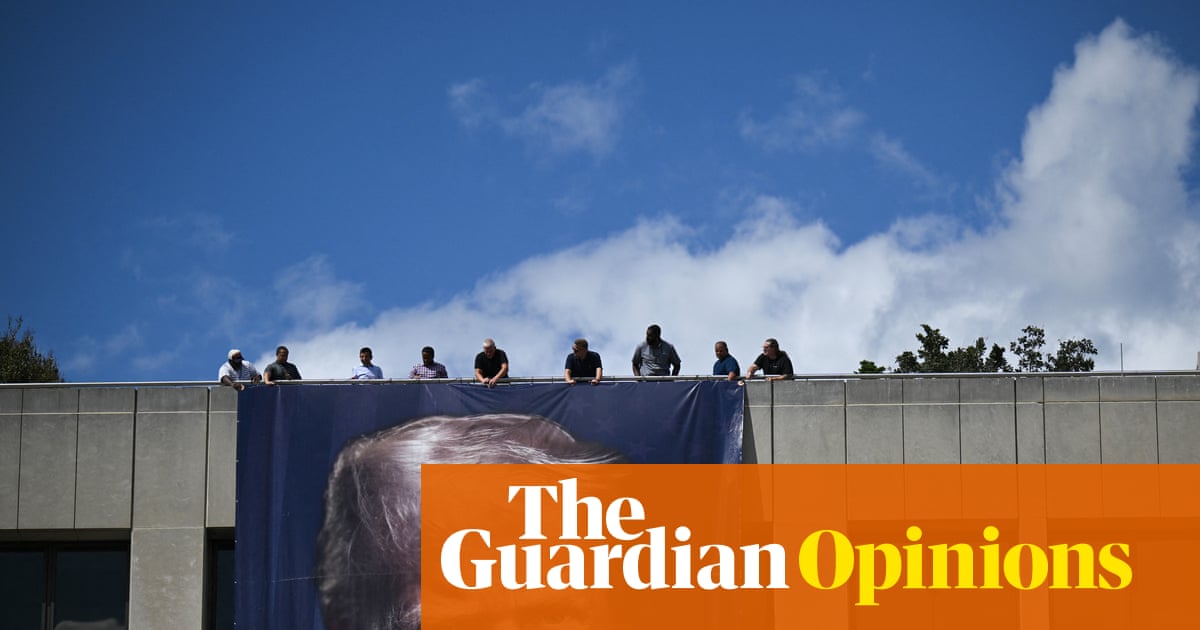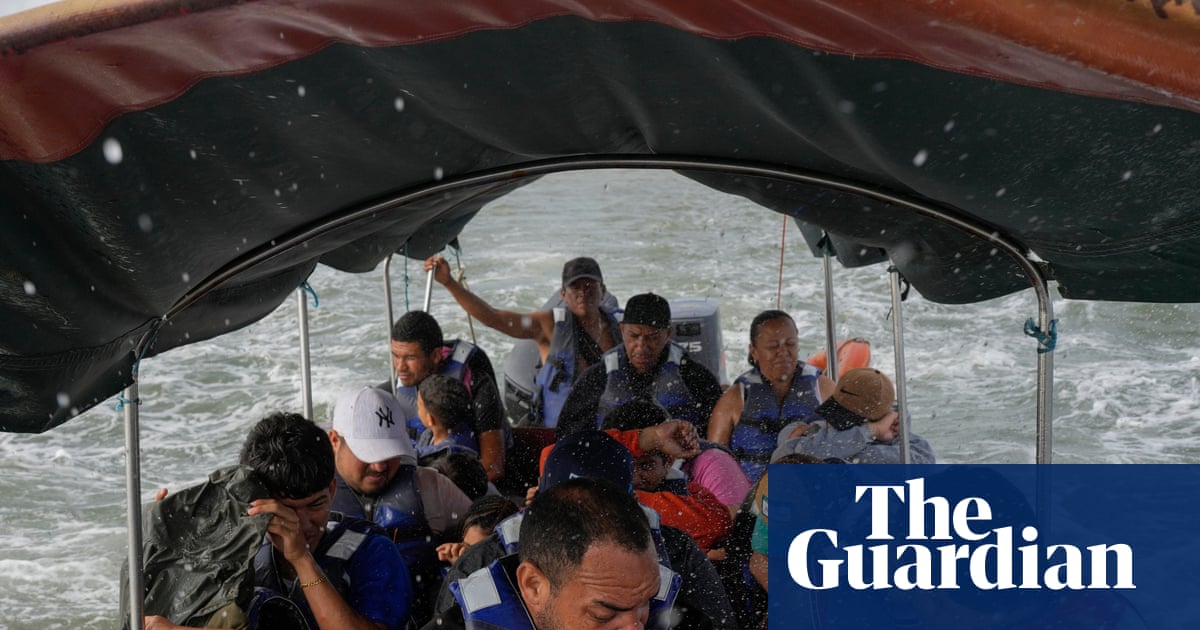A man whose loved ones thought he had died at Florida’s Alligator Alcatraz after alleged delays in appropriate medical care turned out to be alive and was then secretly moved to the immigration detention camp at Fort Bliss, Texas – and has since been moved again.
Luis Manuel Rivas Velásquez is awaiting deportation in what his lawyers said he described as a “living hell”.
Rivas Velásquez, 38, had already signed an agreement to be deported after becoming desperate in detention and feeling worn down in his efforts to be granted asylum in the US amid Donald Trump’s anti-immigration efforts.
“All that Luis wants desperately is to get out of detention, even if that means being deported to Venezuela,” said Becca Sheff, senior staff attorney of the American Civil Liberties Union (ACLU) of New Mexico. “That’s what it’s come down to for him and for so many others.”
Instead, Rivas Velásquez was flown to the new Camp East Montana Immigration and Customs Enforcement (Ice) detention facility housed at the US military base of Fort Bliss, apparently without the knowledge of his family or attorneys.
Then it emerged that he has since been transferred again to an Ice processing center in nearby El Paso, where details of the conditions and his current circumstances were unclear.
Attorney Eric Lee, at Lee & Godshall-Bennett, who is representing him, described Rivas Velásquez’s treatment as “enforced disappearance” and said he considered his client’s constant moves from one facility to another as retribution for denouncing conditions for detainees and seeking legal redress.
“He has described [himself and others] being treated like animals, in unbearable conditions,” Lee said. He added that Rivas Velásquez had described conditions in Alligator Alcatraz in the Florida Everglades as a “nightmare” and a “living hell” and that Fort Bliss was “just as bad”.
The first his lawyer or his loved ones knew of his being moved to Texas was when Lee received a brief call from Rivas Velásquez.
Before being first detained in Florida in July, Rivas Velásquez was a media influencer living in Miami and known to his social media followers as Luis Frio.
He was confined at the camp in south Florida that was recently opened by the state and has been holding people on behalf of Ice, championed by Trump. Earlier this month, it was ordered closed by a judge within 60 days and the authorities are now swiftly moving people out.
It has attracted waves of criticism for harsh conditions by design, alleged abuse of detainees, denial of due process as the men locked up there await deportation and environmental harm.
Earlier this month, Rivas Velásquez had collapsed, unconscious, on the floor at the Florida camp, and Sheff said that guards were apparently slow and appeared not to know the best way to help him. It was another detainee, a nurse from Cuba, who provided CPR before the Venezuelan was taken to a Miami hospital and diagnosed with a respiratory infection, both attorneys said.
The Florida division of emergency management did not respond to a request for comment before publication.
“His family did not know if he was dead or alive. His attorneys could not get a hold of him,” Sheff said.
Loved ones posted on social media that they believed he had died. His girlfriend, Rosana Navas, posted a tearful message from Miami that, translated from Spanish, said in part: “He died at Alligator Alcatraz due to the negligence of the United States government. He asked for medical attention, but they didn’t give it to him. He was covered in sores. He ate only once a day. We just need someone to help us transport his body … his family is in Venezuela, distraught.”
Tricia McLaughlin, assistant secretary for public affairs at the Department of Homeland Security, the parent agency of Ice, issued a statement that Rivas Velásquez had fainted and “was taken to the hospital out of precaution”.
The statement added that: “All detainees at Alligator Alcatraz have access to proper medical care” and that Ice takes its commitment to protecting those in its custody “very seriously”.
At the time, Lee was convinced there had been an outbreak of Covid-19 at the facility, which the authorities have not confirmed. He has filed a legal complaint and joined a class-action lawsuit against the facility about conditions there.
McLaughlin also said that Rivas Velásquez had “a rap sheet that includes an arrest for robbery in Miami”.
Lee said the charges stem from a fight that Rivas Velásquez had with his girlfriend, Navas, during which he took her phone. He said his client did not have any other criminal history in the US.
He had entered the US legally via the El Paso port of entry last year, having received an appointment with the US immigration authorities after applying via the CBP One mobile phone app.
Trump shut down the scheduling and pre-screening app on the first day of his second term as US president this January and then changed it to a tool where immigrants could request removal from the US. The administration now increasingly regards many people who have been living in the US legally as suddenly illegal.

Sheff said the Fort Bliss facility had mostly immigrants from Venezuela, Vietnam, Haiti, Jamaica and Cuba who have been transferred from other jails. The ACLU tried to visit Rivas Velásquez there but said it was denied access.
“There are people who are still fighting their cases [to stay in the US] in immigration courts, who have not been ordered to be deported,” she added.
Melissa Lopez, the executive director of local advocacy group Estrella del Paso, estimates that half of the 1,000 detainees at Camp East Montana “have had some kind of run-in with the criminal justice system” but said that could be as minor as having a traffic ticket.

Organizations that have been calling for the facility at Fort Bliss to be shut down complain that detainees at the camp have been limited to receiving phone-only legal consultations, which are not private and sometimes denied.
Lee said communications with Rivas Velásquez at Camp East Montana had been often inaudible, one-minute phone calls with a poor connection.
“He called in a panic, explaining that he had been denied access to necessary blood pressure and anxiety medication. He said he has not even been allowed to change his clothes in five days,” Lee said last weekend. “Before we could ask additional questions, the call was abruptly terminated.” Later, Lee learned that his client had then been moved from the military base and was now being held at an Ice processing center.
McLaughlin said in a statement last week: “The Fort Bliss facility will offer everything a traditional Ice detention facility offers, including access to legal representation and a law library, access to visitation, recreational space, medical treatment space and nutritionally balanced meals. It also provides necessary accommodations for disabilities, diet, and religious beliefs.”
The Ice office in El Paso did not respond to a request for further comment.
Lee said the situation was not fair.
“All Mr Rivas Velásquez wants is to be deported, yet the government continues to detain him at the taxpayers’ expense,” Lee said, arguing that his client’s case was another example of the federal government “going out of its way to prevent access to counsel for detained foreign nationals”.

 German (DE)
German (DE)  English (US)
English (US)  Spanish (ES)
Spanish (ES)  French (FR)
French (FR)  Hindi (IN)
Hindi (IN)  Italian (IT)
Italian (IT)  Russian (RU)
Russian (RU)  3 hours ago
3 hours ago
























Comments